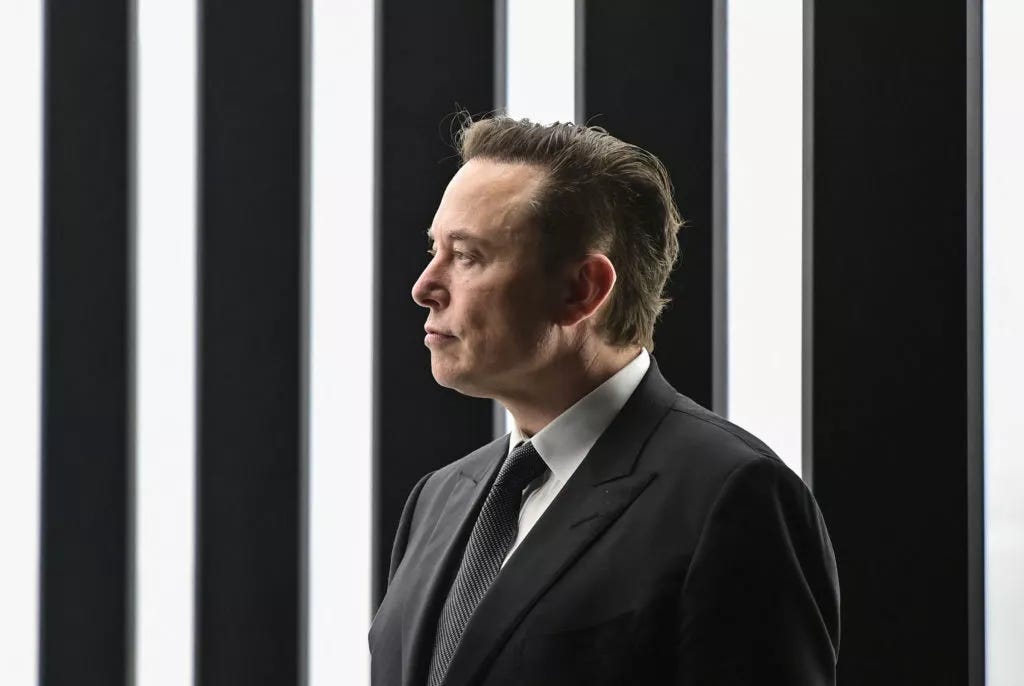“Free Speech” Ought to Mean More than Mocking Trans People
Plus, Dinesh D’Souza’s 2000 Mules Is a Hilarious Mockumentary
Recently at The Bulwark:
CHARLIE SYKES: McDonald’s and the Future of Russia
SONNY BUNCH: Should Netflix Have Stood Up to Its Employees?🔐
SECRET POD: Deport D’Souza? 🔐
You can support The Bulwark by subscribing to Bulwark+ or just by sharing this newsletter with someone you think would value it.
NICHOLAS GROSSMAN: “Free Speech” Ought to Mean More than Mocking Trans People.
Explaining why he wants to (maybe) buy Twitter, Elon Musk said that he values free speech. Here’s how he defined it: “By ‘free speech’, I simply mean that which matches the law. I am against censorship that goes far beyond the law.”
That definition is both shallow and contradictory. And it does not offer any guidance to the challenging questions the idea of “free speech” poses to a genuinely free society.
In the United States, the First Amendment says the government cannot punish you for speech (with some established exceptions, such as incitement and sexual harassment). The same law also protects free association—meaning that it’s perfectly legal for private organizations to exercise their freedom of association by excluding some speech. A support group for widows doesn’t have to let a never-married man talk. A Bible study group doesn’t have to give equal time to an atheist. Private groups can choose to do so if they want; but they can’t be compelled to.
Similarly, websites can have a terms of service agreement. They can also choose how to moderate content, as they try to create a community and appeal to users. To pick an easy example, websites are not legally required to host pornography, even though porn is protected speech under the First Amendment.
Musk knows that “matches the law” is a bad standard—though it would give him an excuse to kowtow to censorship demands from China, which accounts for a quarter of the sales and half the production for his electric car company Tesla—which is why he shifts in the very next sentence to the claim that content moderation shouldn’t go “far beyond the law.” But that’s already the consensus for moderation, at least on mainstream platforms: Go beyond the law, but not too far. Sure, some ideologues call for heavy-handed censorship, but no social network implements their pure vision, not least because these platforms are businesses and that’s not what the market wants.
The debate is over what, exactly, constitutes “too far.” What content moderation rules and enforcement mechanisms produce the sort of engagement, discourse, and culture—and therefore attract and keep the sort of users—that make a website a going concern? For the most influential platforms, which practices serve the overlapping, but sometimes conflicting, goals of what’s best for the company, the users, the country, and the world?
For Elon Musk and many others who complain about Twitter’s policies, the answer seems to be a lot narrower than abstract appeals to free speech suggest.
Conspiracy politics are turning evangelicals against each other as the Church becomes increasingly radicalized — an unraveling that went into overdrive during the shutdown. Tim Alberta joins Charlie Sykes today to discuss the war for the soul of the Church.
Bulwark+ members can listen to an ad-free version of these podcasts on the player of their choice. Learn more at Bulwark+ Podcast FAQ.
THEODORE R. JOHNSON: What Do Black Americans Think About Roe v. Wade—and Why.
In 2016, I conducted a study to examine how the black vote might become less lopsided in presidential elections. Using a survey experiment, I was able to measure how much certain factors—the economy, healthcare costs, the violent crime rate, etc.—influenced black Americans’ voting choices to see which mix of conditions would produce more competition for their vote. The results were mostly unsurprising: For black Americans, as with the general population, the political party cues were so strong that they far outweighed every other consideration.
There was, however, one rather unexpected insight. The political issue that most influenced black voters’ choice was abortion. Supporting a pro-choice presidential candidate was more important to black voters than the unemployment rate, obtaining new civil rights legislation, a candidate’s race, and every other presented factor except party.
I was reminded of this finding following the leak of Justice Samuel Alito’s draft Supreme Court opinion that would overturn Roe v. Wade. And, like most issues in black America, the politics of abortion are not nearly as straightforward as the associated voting behavior.
AMANDA CARPENTER: Dinesh D’Souza’s 2000 Mules Is a Hilarious Mockumentary
Dinesh D’Souza’s 2000 Mules is Plandemic for election truthers. For the non-insane, it’s a hilarious mockumentary. Not that D’Souza cares what the non-insane think: He has discovered that there are enough suckers out there to keep him laughing all the way to the bank.
Released by the Salem Media Group, 2000 Mules aspires to be a work of serious investigative reporting which will rock the foundations of American democracy. In reality, 2000 Mules is an investigative documentary in roughly the same way Reno 911 was a hard-hitting look at real-life police work. Though that doesn’t mean that D’Souza’s cash-grab won’t further pollute the political system. For instance, Kari Lake, who can’t wait to get elected governor of Arizona so she can jail her political opponents, is championing the film—which ends with a plea for law enforcement to take up D’Souza’s cause.
🚨OVERTIME 🚨
RIP Dr. John Cheng. You’re an American hero in my book.
Feel the pain. Of this. It is not good.
Great Replacement Central.
Come again? This lady is suing because her son won’t do chores because… CRT?
Kareem Abdul-Jabbar vs. Ben Shapiro. That’s all I have.
That’s it for me. Tech support questions? Email members@thebulwark.com. Questions for me? Respond to this message.
—30—
Editorial photos provided by Getty Images. For full credits, please consult the article.





